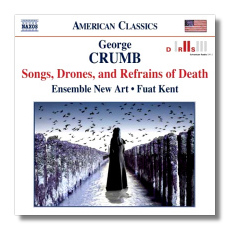
The Internet's Premier Classical Music Source
Related Links
- Crumb Reviews
- Latest Reviews
- More Reviews
-
By Composer
-
Collections
DVD & Blu-ray
Books
Concert Reviews
Articles/Interviews
Software
Audio
Search Amazon
Recommended Links
Site News
 CD Review
CD Review
George Crumb

Crumb, Lorca, and Amazing Grace
- Songs, Drones, and Refrains of Death (1962-68)
- Quest (1994)
Nicholas Isherwood, baritone
Ensemble New Art/Fuat Kent
Naxos 8.559290 54:45
Summary for the Busy Executive: Harvest from stony ground.
As far as fashion goes, the Sixties and Seventies were largely a dismal time for new music. Composers, tired of patronizing treatment from the academy, particularly from the scientific and mathematical divisions, decided to out-scholacize the scholastics. Many of the composers then had mathematical training and wrote music using clues from set theory. The problem was that most of the results sounded pretty much the same. An individual voice like Milton Babbitt spawned little tadpoles whose musical essence was distinguishable only by other tadpoles. A drop-the-needle test with most of this music yields little but futility. It was a time when one could write down the Ten Rules for a Successful Piece – really a form of deadly artistic gentility, an emphasis on means, rather than on result.
Yet even during such a period, certain figures stood apart, by a different sensibility or something as basic as a different sound. I've already mentioned Babbitt, but we could also cite Berio, Boulez, and especially George Crumb. Arguably, Crumb became the most influential composer of the period, affecting younger men like Joseph Schwantner and Osvaldo Golijov and many Europeans, including, I would say, Henryk Górecki – all the more remarkable, considering the sparseness of Crumb's output. Essentially, Crumb is one of those rare composers who re-imagine what music can be. These don't necessarily comprise the greatest composers. C. P. E. Bach, for example, innovated far more than his daddy, Johann Sebastian, who instead derived his practice from at least a couple of generations of North Germans before him. I have no idea whether Crumb is great, since – other than by consensus – I don't know what "great" means. However, his music gets inside me and reconfigures my psychic landscape.
In a way, Crumb writes music that seems, at first glance, not only spanking-new, but impossible. The Songs, Drones, and Refrains of Death typifies his experimentalism. The sounds, even though much of it made by conventional instruments, imitate electronics. The sounds and gestures seem to exist in isolation, one having little to do with another. The music moves so slowly, it approaches stasis. You wonder how the piece could possibly hang together, but hang together, it does. Its snail-pace becomes gripping intensity. The isolated gestures are, it turns out, the perfect gestures for their moment. The Songs, Drones, and Refrains constitute perhaps the crown of Crumb's Lorca cycle of the Sixties, so expressive that when I think of Lorca's poetry, I think of Crumb as well. Lorca is to Crumb as Housman and Whitman are to Vaughan Williams or Auden to Britten. Crumb's music bristles with an idiosyncratic sense of drama. This is music less concerned with its contemporaneousness than with expression. For me, it transcends its time, while other works from the Sixties and Seventies, so up-to-the-minute then, show their age.
Crumb works very slowly, as if contemplating the perfect niche for a single note. Finding a shtick and staying with it has tempted many such an artist, but Crumb has changed over the years. Lately, he has changed with each new (long-awaited) score. The knife-sharp passion of his Lorca pieces has, for example, given way to something more gracious, represented by his Quest. Crumb admits that the title inspired him but denies that the work has a program. To me, it's a kind of hymn to or meditation on the American South, particularly the Appalachians. This undoubtedly is due to the quotes from the folk hymn-tune New Britain ("Amazing Grace"), which turns up in fragments throughout, but relatively whole in the first and last movements. The pentatonics of the hymn leaven and lighten Crumb's usual dissonances. A noble work.
Both performances are good, although I prefer Joel Thorne leading the Philadelphia Composer's Forum in the Songs, Refrains, and Drones on the Phoenix label. Thorne's account hangs together better than Kent's. Still, Kent gives you the flavor of the piece, and the Naxos price may encourage people to experiment.
Copyright © 2008, Steve Schwartz




















